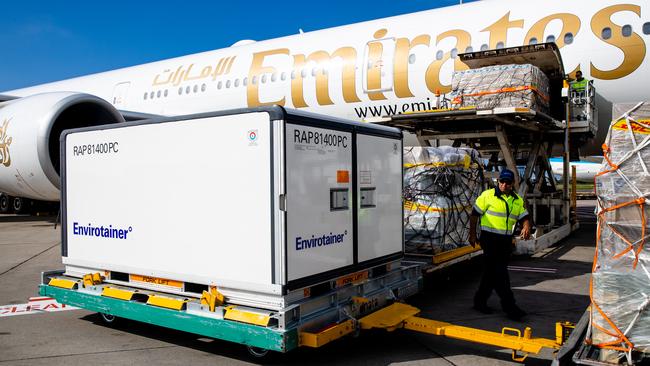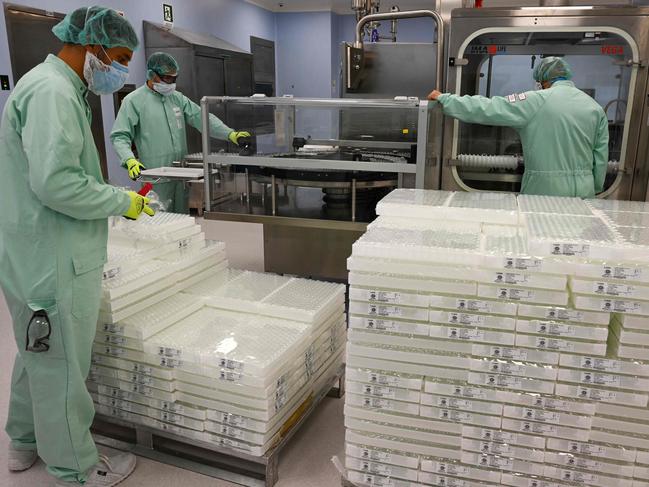Australia’s 3.8m AstraZeneca jabs at risk as European leaders up ante in vaccine wars
Tough new controls to be rolled out in Europe mean Australia’s shipment of 3.8m AstraZeneca jabs may never be delivered.

Delayed AstraZeneca vaccine exports to Australia are unlikely to resume, with European leaders planning even tougher controls on future shipments of the vaccine outside the bloc.
Australia has already had one international shipment of 250,000 doses cancelled by the Italian government, and future supplies to fulfil Australia’s international order of 3.8 million doses are set to be abandoned for several months, if not permanently.
The EU is set to introduce tougher controls at a Brussels summit on Thursday which assesses a country’s vaccination rates and access to vaccines before any approval will be given for any shipment. The new export authorisation mechanism is based on “proportionality” of what the EU considers to be appropriate, rather than AstraZeneca’s contractual deals.
The new rules, if adopted, look at reciprocity of vaccines, the epidemiological situation in the non-EU country, its vaccination rate and existing availability of COVID-19 vaccines.
The EU, which was slow to sign vaccine deals, wants EU-made vaccines to be used to vaccinate only EU citizens, amid an embarrassingly low rollout of doses across the continent.
EU leaders, including German chancellor Angela Merkel and French president Emmanuel Macron, have backed the plans in order to fast track their domestic vaccine programs which have been beset by logistic and political issues.
The EU demands came as it was revealed eight million doses of AstraZeneca were being stored but not used in Germany and France. Locals have been hesitant to administer the vaccine following earlier political pronouncements that it wasn’t effective.
The confusing situation was highlighted in Germany where Mrs Merkel reversed a five-day lockdown over Easter just a day after imposing strict new rules that would have forced even supermarkets to close. The change came following a huge community outcry.
“This mistake is my mistake alone,” Mrs Merkel said.
“It was well reasoned, but was not really doable in such a short time. Far too many questions, from missing wages through to the loss of time in factories and facilities, could not be adequately answered in time.’’
Italian Prime Minister Mario Draghi said he wanted to increase daily vaccinations up to half a million a day from the current levels of about 170,000.
“We must ask pharmaceutical companies to fully respect their commitments on a European level,” Mr Draghi said.
Just 10 per cent of citizens in France and German have received their first jab, compared to more than half of the adult population in the United Kingdom.
Australia is looking to manufacture 50 million doses of the AstraZeneca vaccine under licence at the CSL factory, with the first batches from the Broadmeadows plant rolled out this week.
The international batches had been meant kickstart the local vaccination program while the CSL factory was getting the required regulatory approvals.
Europe is now highly unlikely to allow shipments to Australia because of the country’s very low COVID-19 exposure and it’s own manufacture of vaccine supplies. But the new EU rules are squarely pointed at the UK.
European Commission vice president Valdis Dombrovskis said Europe faced a “very serious epidemiological situation”, claiming that 10 million AstraZeneca doses had been exported from the bloc to the UK while the EU had not received vaccines from the UK.
But the UK said it had been delivering components required for the European manufacture of the Pfizer BioNTech vaccine.
British prime minister Boris Johnson warned the European Union that it risked future investment in the bloc if it followed through with threats to immediately impose a “non-sensible” trade blockade of coronavirus vaccines.

On Wednesday, Italian police raided a factory in Anagni which had bottled 29 million doses of the AstraZeneca vaccine in order to verify their final destination, fearing the batches would be exported to the UK.
But AstraZeneca said 16 million doses were for EU distribution from Brussels and the remainder were for poor countries under the international Covax regime, highlighting the EU’s paranoia about the UK’s successful vaccine rollout. The company said none of the Anagni vaccines were destined for the UK.
Mr Johnson told a parliamentary committee ahead of the EU summit that companies would reconsider investing if the EU imposed trade blockades.
“I would just gently say to anybody considering a blockade, or interruption of supply chains, that companies may look at such actions and draw conclusions about whether or not it is sensible to make future investments in countries where arbitrary blockades are imposed,” Mr Johnson said.




To join the conversation, please log in. Don't have an account? Register
Join the conversation, you are commenting as Logout